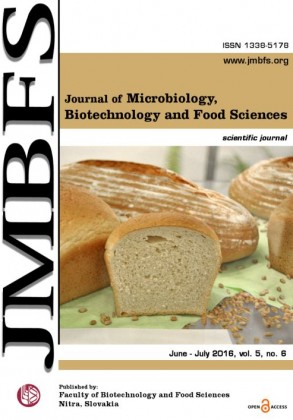APPLICATION OF RYE SSR MARKERS FOR DETECTION OF GENETIC DIVERSITY IN TRITICALE
DOI:
https://doi.org/10.15414/jmbfs.2016.5.6.623-626Keywords:
Triticale, microsatellites, polymorphism, dendrogramAbstract
Present study aims to testify usefulness of particular rye SSR markers for the detection of genetic diversity degree in the set of 20 triticale cultivars coming from different European countries. For this purpose, a set of six rye SSR markers were used. The set of six polymorphic markers provided 22 alleles with an average frequency of 3.67 alleles per locus. The number of alleles ranged between 2 (SCM43) and 5 (SCM28, SCM86). Resulting from the number and frequency of alleles diversity index (DI), polymorphic information content (PIC) and probability of identity (PI) were calculated. An average value of PIC for 6 SSR markers was 0.505, the highest value was calculated for rye SSR marker SCM86 (0.706). Based on UPGMA algorithm, a dendrogram was constructed. In dendrogram cultivars were divided into two main clusters. The first cluster contained two cultivars, Russian cultivar Greneder and Slovak cultivar Largus, and second included 18 cultivars. Genetically the closest were two Greek cultivars (Niobi and Thisbi) and were close to other Greek cultivar Vrodi. It was possible to separate triticale cultivars of spring and winter form in dendrogram. Results showed the utility of rye microsatellite markers for estimation of genetic diversity of European triticale genotypes leading to genotype identification.Downloads
Download data is not yet available.
Downloads
Published
2016-06-01
How to Cite
Balážová, ŽelmÃÂra, Gálová, Z., & VivodÃk, M. (2016). APPLICATION OF RYE SSR MARKERS FOR DETECTION OF GENETIC DIVERSITY IN TRITICALE. Journal of Microbiology, Biotechnology and Food Sciences, 5(6), 623–626. https://doi.org/10.15414/jmbfs.2016.5.6.623-626
Issue
Section
Biotechnology
License
Copyright (c) 2016 ŽelmÃÂra Balážová, Zdenka Gálová, Martin VivodÃk

This work is licensed under a Creative Commons Attribution 4.0 International License.
All papers published in the Journal of Microbiology, Biotechnology and Food Sciences are published under a CC-BY licence (CC-BY 4.0). Published materials can be shared (copy and redistribute the material in any medium or format) and adapted (remix, transform, and build upon the material for any purpose, even commercially) with specifying the author(s).





